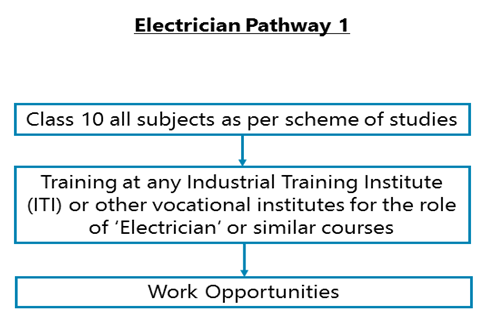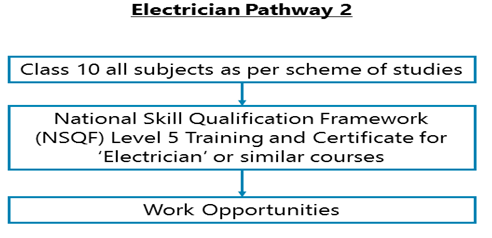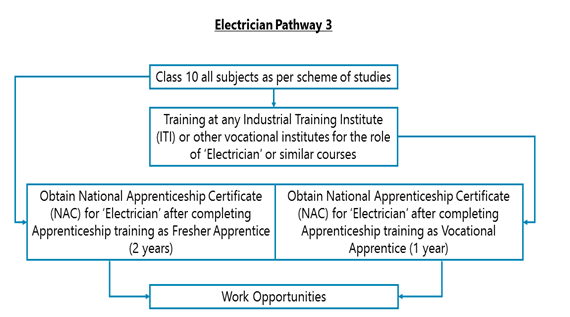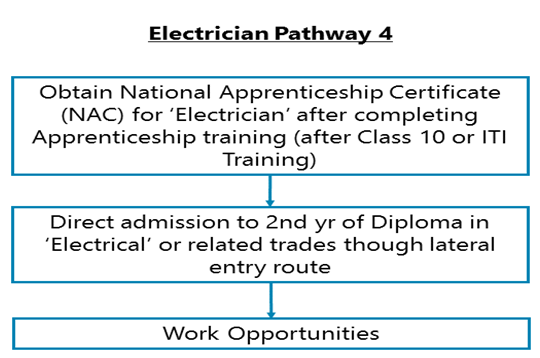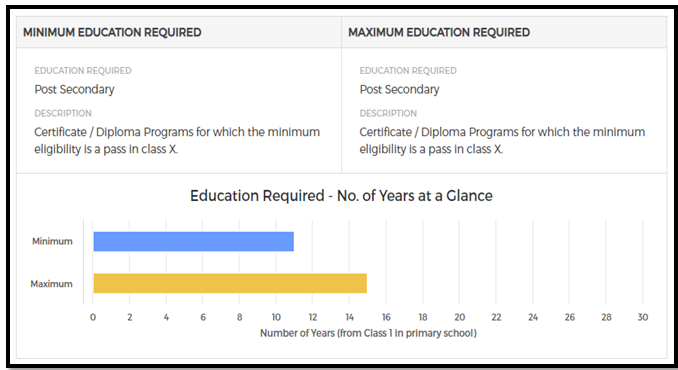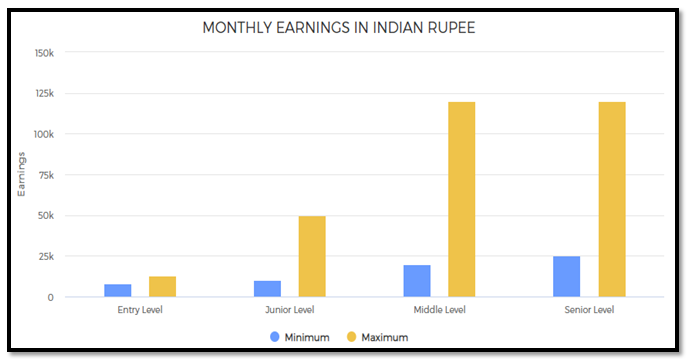Electrician
Entry Level Qualification
10
Career Fields
Plumber, Fitter, Electrician, Welder & Carpenter
For Specially Abled






Career Entrance Exam
About Career
As an Electrician, you will be laying out and install wiring and related devices such as distribution boxes, switchboards, power plug points, switches, etc. for transmission of electricity in houses, offices, commercial facilities, industrial facilities and elsewhere. You will also fit and install electrical equipment such as lights, fans, water pumps, electrical motors, generators, and various other equipment and devices which are run by electrical power. You will have to repair and maintain all these wiring, equipment and devices.
You will be using various tools such as multi meter (for testing voltage and other parameters), power testers, cable cutters, voltmeters, etc.
You may be involved in setting up and commissioning powers transmission and distribution lines from power plants to sub-stations, from sub-stations to transformers and from transformers to homes, offices and other facilities. You will be laying out and commission power transmission cables either over ground (on transmission towers or poles) or underground.
Key Roles and Responsibilities:
As an Electrician, you will be engaged with one or more of the following roles and responsibilities: -
1. Diagnosing faults in electrical systems and units and dismantling them if required using testing equipment.
2. Replacing defective parts of electrical equipment and adjusting mechanical parts using hand tools.
3. Applying knowledge to the working of electrical appliances for locating defects.
4. Installing new equipment as additions to existing electrical fittings.
5. Studying and interpreting manuals, blueprints, diagrams and other specifics for determining installation requirements.
6. Inspection of electrical components of equipment so that new installations are accurate
7. Ensuring proper functioning of industrial electrical equipment.
8. Operating electrical industrial equipment for demonstrating its uses and functions or to find defects.
9. Instructing customers regarding proper maintenance and use of electrical devices.
10. Inspecting/analyzing/fixing connections between more than one electrical devices/industrial units.
PARTICULARS | DESCRIPTION |
Name | Electrician |
Purpose | Inspecting/Analyzing/Fixing Connections |
Career Field | Plumber, Fitter, Electrician, Welder & Carpenter |
Required Entrance Exam | No Entrance Exam |
Average Salary | 100000 - 200000 Rs. Per Year |
Companies For You | Power Distribution Companies, Electric Power Generation Plant & Many More |
Who is Eligible | Any One |
Career Entry Pathway
Class 10 all subjects as per scheme of studies – training for ‘Electrician’ at an ITI or similar institute
After Class 10, you can go for training at any Industrial Training Institute (ITI), National Skill Training Institute (NSTI), Regional Vocational Training Institute (RVTI), National Vocational Training Institute (NVTI), Industrial Training Center (ITC) or other vocational institutes for the role of ‘Electrician’. This is a 2-year training course with 4 semesters (6 months each). You will sit for All India Trade Test (AITT) to get a National Trade Certificate (NTC) after this course. This exam is held twice a year in the months of February and July
Class 10 all subjects as per scheme of studies - NSQF Level 5 Certificate for ‘Electrician’ or similar courses
After Class 10, you canobtain a National Skill Qualification Framework (NSQF) Level 5 Training and Certificate for ‘Electrician’ or similar courses. The total number of training hours is 4160
Class 10 all subjects as per scheme of studies – training for ‘Electrician’ at an ITI or similar institute – obtain National Apprenticeship Certificate
After Class 10, you can go for training at any Industrial Training Institute (ITI), National Skill Training Institute (NSTI), Regional Vocational Training Institute (RVTI), National Vocational Training Institute (NVTI), Industrial Training Center (ITC) or other vocational institutes for the role of ‘Electrician’. This is a 2-year training course with 4 semesters (6 months each). You will sit for All India Trade Test (AITT) to get a National Trade Certificate (NTC) after this course. This exam is held twice a year in the months of February and July. Then you can obtain National Apprenticeship Certificate (NAC) for ‘Draughtsman (Mechanical)’ after completing Apprenticeship training. You can join the Apprenticeship program after passing Class 10 also. Apprenticeship training is of the following durations. After you complete: Class 10 with any subjects, Science and Mathematics (as a Fresher apprentice): 2 years of Basic training (6 months) and Practical training (18 months). ITI course (as Vocational Apprentice): Only Practical training (12 months)
Obtain National Apprenticeship Certificate (after Class 10 or ITI training) – admission to 2nd year of Diploma in Electrical Engineering
After obtaining a National Apprenticeship Certificate (NAC) for ‘Electrician’ through Apprenticeship training (after Class 10 or ITI Training), you can get direct admission to 2nd year of Diploma in Electrical Engineering and then find work in industries
Class 10 all subjects as per scheme of studies – CTS Training in ‘Electrician’ trade
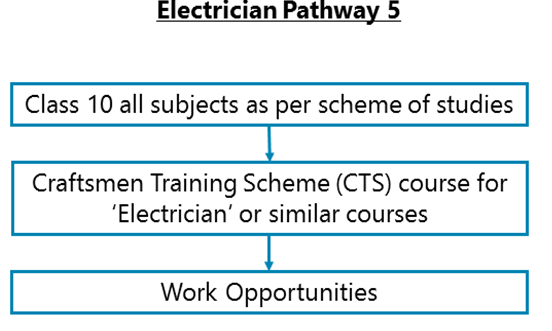
After Class 10, you can go for the Craftsmen Training Scheme (CTS) course for ‘Electrician ‘or similar courses. This is a 2-year course with 4 semesters of 6 months each.
Required Qualification & Competencies
After Class 10, you can do the following:
1. National Skill Qualification Framework (NSQF) Certificate and Training.
2. National Apprenticeship Certificate (NAC) after apprenticeship training.
3. Go for a Diploma in ‘Electrical’ or related trades after getting NAC.
4. Take vocational training at an ITI (or similar institute).
5. Craftsmen Training Scheme (CTS) Course.
Various private/public vocational training establishments across India offer the following or similar courses:
1. Electrical Mechanic
2. Electrical Trade
3. Electrician
4. Electrician (Mines)
5. Electrician (Steel Plant)
6. Electrician Aircraft
7. Mechanic Auto Electrical and Electronics
8. Mechanic Electrical Maintenance (Industrial Automation)
9. Mechanic (Electrical Power Drives)
10. Mechanic (Repair & Maintenance of Instruments used in Electrical Engineering)
11. Mechanic (Electrical Domestic Appliances)
Compentencies Required
1. You should have interests for Realistic Occupations. Realistic occupations involve more practical and hands-on activities than paperwork or office work. Realistic occupations often involve physical activities for getting things done using various tools and equipment.
2. You should have interests for Conventional Occupations. Conventional occupations involve repetitive and routine tasks as well as fixed processes or procedures for getting things done. These occupations involve working more with data, systems, and procedures and less with ideas or creativity.
3. You should have knowledge of Electrical and Electronics- Knowledge of circuit boards, processors, chips, electronic system design, electronic equipment, electrical equipment and appliances, electrical power generation, etc.
4. You should have Machine Repair and Maintenance Skills - performing repair and maintenance of different machines, equipment, and devices.
5. You should have Problem Solving Skills - analysis and understanding of problems, evaluating various options to solve the problems and using the best option to solve the problems.
6. You should have Arm-Hand Steadiness - The ability to keep your hand and arm steady while moving your arm or while holding your arm and hand in one position.
7. You should have Manual Dexterity - The ability to quickly move your hand, your hand together with your arm, or your two hands to grasp, manipulate, or assemble objects.
8. You are always or mostly careful about your actions and behavior.
9. You are practical always or in most situations.
10. You are always or mostly disciplined in your action and behavior.
11. You are always or mostly serious about your actions and behavior.
12. You are always or mostly organized in your day-to-day life and activities.
Career - Job Opportunities & Profiles
You can start as an Electrician, Maintenance Electrician, ITI Electrician, Electrical Maintenance – Executive, Electrical Installation Works Executive, Wiring Technician etc. in:
1. Various Electrical Equipment Manufacturing Industries.
2. Process industries.
3. Industries manufacturing Solar power based inverters.
4. Power Distribution Companies.
5. Service industries Home appliances manufacturing company.
6. Electric Power Generation Plant.
7. Central & State Govt. and public sector industries and private industries in India & abroad.
8. Petrochemical industries.
9. You may also start your own business after the necessary education and work experience.
Specialisation Tracks In This Career
Electrician (General and Domestic Solutions)
They generally deal with common electrical work specifically in commercial or residential spaces including installations, repair, testing and maintenance of electrical connections, domestic wiring/earthing, common electrical appliances and related tasks with the usual power and hand tools. They may also be involved in operating and maintaining electrical pumps, motors, microphones, loudspeakers etc.
Electrician (Construction Sites)
They work specifically at a construction site. They are usually responsible for installing and maintaining motors, bar cutting/shearing machines, electrification of buildings, read/understand electrical drawings, manufacturer’s specifications, operational/safety guidelines as per the requirements at construction sites.
Industrial Electrician
They mainly perform wiring, cable connections and jointing (cable joints protect cables from dust, moisture etc), operate/maintain/repair transformers, motors, generator sets, storage batteries, plan/install/test earthing designs etc. in an industrial environment at factories, petroleum refineries etc. They need to have a thorough knowledge of legal regulations and safety guidelines and apply it at work.
Mine Electrician
They work in mines and manage the electrical circuits, lights, motors, switches, installations, switchgear, switchboards, transformers, cap lamps, pumps, fuses, wiring etc. in mines. They test and maintain the electrical machinery and equipment in the mines, test defective connections and locate faults. They always need to examine all apparatuses to prevent danger.
Transmission Line Electrician
They identify towers, transmission line, tower parts, insulators of different voltages, make required arrangements for the erection of the towers and tower parts using appropriate tools. They need to take care of the anchoring required to erect the tower. They also perform stringing of transmission lines with proper protective equipment.
Automotive Electrician
They are responsible for servicing and repairing electronic and electrical faults in diesel, petrol, electrical, CNG and hybrid vehicles. They need to study the electrical/electronic components of vehicles like steering systems, clutches, batteries, suspension systems, hydraulics, braking systems and know how to use the standard tools for repairing them.
Career Growth
You can certainly progress to be a Senior Electrician or Senior Technician or Services Specialist in any organization with proper training and certification, after some initial experience as Electrician, Electrical Technician, Assistant Electrician, Wireman, Machinery Electrician, Fitter, Welder, etc.
Salary Offered
1. Salaries vary according to job profiles and the kind of facilities you get to work at.
2. In the entry-level jobs: You may expect between Rs.8000 – 13,000 or more per month.
3. Salaries increase with your work experience and as you get promoted. In the mid-level jobs, with 4-5 years of work experience, you may expect between Rs.10,000 –22,000 or more per month.
4. After having 6-10 years of work experience, you may expect to earn between Rs. 20,000 – 28,000 per month or even more.
5. There is a lot of demand for trained Electricians abroad, mostly in Middle Eastern and African countries. After having 2-5 years of experience, as an Electrician, you can earn about Rs. 35,000 – 50,000 or more per month. In these jobs, after having, 7-12 years of experience, you can earn about Rs. 50,000 – 1, 20, 000 or even more per month.
Monthly Earnings In Indian Rupee
1. Entry level: 0 - 2 years of work experience
2. Junior Level: From 1 to 12 years of work experience
3. Mid Level: From 5 to 20+ years of work experience
4. Senior Level: From 10 to 25+ years of work experience (there could be exceptions in some high-end technical, financial, engineering, creative, management, sports, and other careers; also in the near future, people will reach these levels much faster in many careers and in some careers, these levels will have no meaning as those careers will be completely tech skill driven such as even now, there is almost no level in a Cyber Security Expert’s job)
Work Activities
1. Inspecting equipment, systems, structures, and materials - Inspecting equipment, systems, structures, and materials to ascertain quality, performance, defects, causes of errors, etc.
2. Getting Information and learning - Observing, hearing, reading, using computers, or otherwise obtaining information and learning from it.
3. Analysing and interpreting data and information - Analysis of data and information to find facts, trends, reasons behind situations, etc.; interpretation of data to aid in decision making.
4. Performing physical activities - Performing physical activities that require the use of your arms and legs and moving your whole body, such as climbing, lifting, balancing, walking, stooping, and handling of materials.
5. Fabricating, assembling, and constructing equipment, devices, and products - Fabricating, assembling, constructing or otherwise manufacturing products, equipment, devices and tools; testing and calibrating products, equipment, devices, tools and systems.
6. Providing advice and consultation to others– Giving advice or consultation to others about various issues, conceptual matters, know-how, scientific matters, products or services for people/customers/workers to follow regarding repair, proper maintenance and use of electrical components.
Future Prospects
The future seems to show bright prospects in this field. Electrical equipment market production is expected to reach 100 billion US Dollars. Engineering Research and Design revenues are forecasted to reach 42 billion US Dollars by 2022. The capital goods industry turnover is forecasted to reach the mark of 115.17 billion US Dollars by 2025. The construction equipment market is expected to touch 7 billion US Dollars. The Indian Appliance and Consumer Electronics Industry has shown tremendous growth to more than 2 trillion Indian Rupees (more than 30 billion US Dollars).
Emerging rural areas also have great purchasing potential, particularly devices like refrigerators and washing machines. Increasing electrification of rural areas is also leading to the growth of this industry. The Indian government aims to provide employment to around 28 million people in the Competitive Electronics Manufacturing Sector. This will generate more opportunities for Electricians too due to the increasing number of manufactured units per year.
Future Prospects At a Glance


